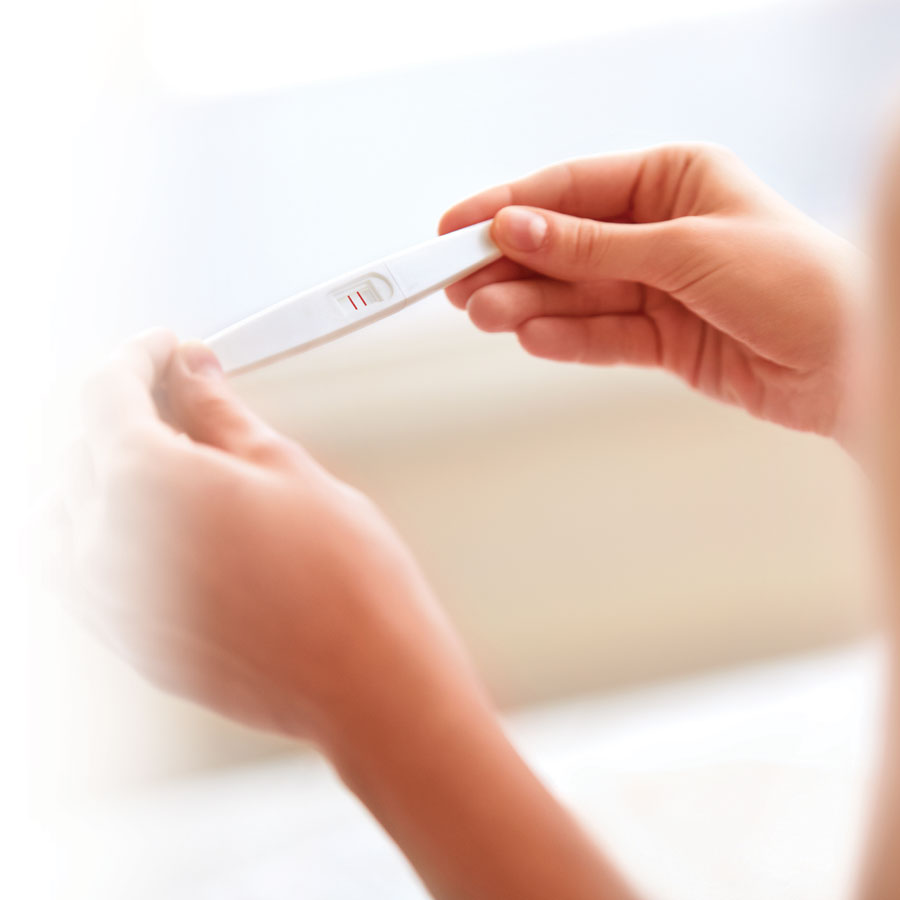When you think you're pregnant, you naturally want to get the confirmation as quickly as possible. But with so many pregnancy tests on the market, it can be hard to find your way around! Which one to choose, and how does it work? Here is some information to help you make sense of it all.
This health tip covers the essential aspects of pregnancy testing, but does not replace the advice of your pharmacist.
What is a pregnancy test?
The pregnancy test... A source of joyful excitement for some women, and a source of anxiety for others. Seemingly trivial, this test offers valuable information to provide a clear answer to the big question on your mind: “Am I pregnant?”
How do I take a pregnancy test?
There are two types of pregnancy tests:
- Urine tests, available at the pharmacy, are small devices that detect the presence of the human chorionic gonadotropin (hCG) hormone secreted by the embryo formed by the fusion of the egg and sperm. These urine pregnancy tests come in the form of strips, usually attached to a stick, with special markers that react on contact with the urine and reveal within minutes whether or not hCG has been detected. Test results are then communicated using various types of indicators, such as a "+" or "-" sign, or a colorimetric band.
- Blood tests, which are more accurate and can detect lower concentrations of hCG, and much earlier than urine tests. However, these tests must be carried out in a hospital or specialized clinic by a healthcare professional.
The urine tests sold in pharmacies are used to detect pregnancy, but they do not provide a definitive diagnosis.
When should I take a pregnancy test?
Most pregnancy tests are designed to detect the presence of hCG from the first day of menstruation. However, some specialized urine tests can detect the hormone up to 6 days before the expected date of menstruation. Most women, however, wait until their period is late before taking a pregnancy test, thus avoiding unnecessary recourse and increasing the reliability of the result. Blood tests, carried out in a medical environment, enable earlier and more accurate detection, often a week before the expected date of menstruation.
You can take a urine test sold in pharmacies at any time following unprotected sex or if you experience pregnancy symptoms such as:
- A delay in your period;
- Nausea/vomiting (especially in the morning);
- Increased appetite;
- An unusual level of fatigue;
- More sensitive, tauter, heavier and firmer breasts.
Which of the pregnancy tests available on the market is the best?
All the pregnancy tests available in pharmacies are equivalent in terms of reliability. However, there are a few differences between the various tests, including:
- Directions;
- Result display mode;
- Time required to obtain the result;
- Detection time before the expected date of menstruation;
- Price.
Ask your pharmacist for help in choosing the test that best suits your needs.
What are the risks of false negatives?
Although pregnancy tests are over 98-99% reliable, some may indicate that you are not pregnant, even though fertilization has taken place. This type of erroneous result is called a "false negative."
Here are some tips to avoid false negatives:
- Test only from the time recommended by the manufacturer.
- Be sure to follow the instructions.
- Test with your morning urine (it will be more concentrated).
- Avoid drinking large quantities of liquids before taking the test.
"The result was negative, but I still don't have my period..."
Obviously, if you get a negative result, your period should come as usual. If not, repeat the test. If you get several negative results, but still don't have your period, consult a healthcare professional.
What are the risks of false positives?
It's also possible to get a "false positive," i.e., a result that indicates you're pregnant when fertilization hasn't taken place. However, this type of case is very rare, and you will need to confirm the positive result with a blood test at the hospital or with your doctor.
"The result is positive, so what's the next step?"
If the result is positive, it is important to make an appointment with a doctor who can confirm the pregnancy diagnosis, estimate the date of delivery, examine you and explain the follow-up process for the coming months. An early consultation is ideal for adapting your lifestyle habits in good time and taking the necessary measures to ensure a smooth pregnancy.
If you don't have a doctor or gynaecologist, contact the nearest CLSC for prompt medical follow-up.
Your pharmacist is also there to help you
Pregnancy is a very important stage in every woman's life, and your pharmacist can help you enjoy a better pregnancy at every stage of your baby's gestation. Your pharmacist's knowledge and availability make them an invaluable resource at this crucial time in your life and that of your baby.


